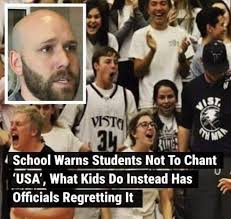A California high school has recently found itself at the center of controversy after school officials urged students to reconsider chanting “USA” at sports events and rallies, expressing concerns about inclusivity and the potential for misunderstanding. The students’ reaction has ignited a larger national conversation about patriotism, free speech, and the meaning of unity.

The Controversy Unfolds
Vista Del Lago High School, located in Folsom, California, became the subject of attention when school administrators advised students to be cautious when using the “USA” chant at school events. The concern, voiced by school officials, was that the chant could be perceived as exclusionary or insensitive in some situations.
Daniel Thigpen, Communications Director for the Folsom Cordova Unified School District, clarified the administration’s stance: “The goal is to encourage empathy, kindness, and true patriotism. It’s important to show pride for your country without unintentionally alienating others.”
While the chant was not outright banned, the guidelines suggested it should only be used at specific times, such as after the Pledge of Allegiance or the national anthem. This advisory was communicated through the school’s P.A. system and an email sent to families. The directive received mixed reactions, with some students and parents feeling conflicted about the implications of these restrictions.
Student Pushback
For many students, the guidance felt like an unnecessary constraint on their expression of patriotism. Senior student Ryan Bernal expressed his frustration: “Saying ‘USA’ is about showing that we’re all united as Americans. No matter our background, we’re all part of the same country.”
Rather than complying with the restriction, students organized a show of unity and pride. During a school rally, they decided to chant “USA” louder than ever before, making their voices heard throughout the gymnasium. This act of resistance highlighted their desire for unity and pride while also sparking a broader discussion about the meaning behind such expressions.
The Bigger Picture
The controversy at Vista Del Lago High School mirrors a larger trend seen in schools across the nation. For many, the “USA” chant represents national pride and unity. However, in some cases, it has been used in ways that could be seen as divisive or exclusionary. Critics argue that the sentiment behind the chant is just as important as the words themselves, and when misused, it can unintentionally alienate others.
Mike Garrison from the California Interscholastic Federation offered his view on the matter: “There’s a time and place for everything. Chanting ‘USA’ should come from a place of inclusivity, not division.” The principal of the school echoed this sentiment, stressing the importance of ensuring the chant promotes togetherness rather than inadvertently creating division.
Community Reactions
The incident sparked heated debates within the local community. Some parents and community members agreed with the school’s guidance, supporting the idea of encouraging sensitivity and inclusivity in student actions. Others, however, felt the school had gone too far, viewing the request as an overreach that infringed on students’ freedom of expression and misinterpreted their intentions.
Natalie Woodbury, a parent of a student, shared her thoughts: “I want my kids to chant ‘USA’ as a way of bringing people together, not making anyone feel excluded. Patriotism should be about lifting others up, not dividing us.”
Social media quickly became a platform for sharing opinions. Some people supported the students for standing firm in their beliefs, while others criticized the school for even raising the issue of the chant.
A Learning Opportunity
In response to the controversy, district officials clarified that the chant had not been banned and hoped the situation could serve as a valuable learning experience. “Our goal is to encourage meaningful dialogue about how we express ourselves and what these expressions mean to others,” Thigpen stated.
Looking Ahead
The events at Vista Del Lago High School have brought to light the delicate balance between fostering inclusivity and upholding freedom of expression. For the students who united in their chant of “USA,” the act was not simply one of defiance but also a declaration of pride and a call for unity.
As debates on patriotism and inclusivity continue to unfold, this incident serves as a reminder of the power of open dialogue and the need to consider diverse perspectives in our communities.





